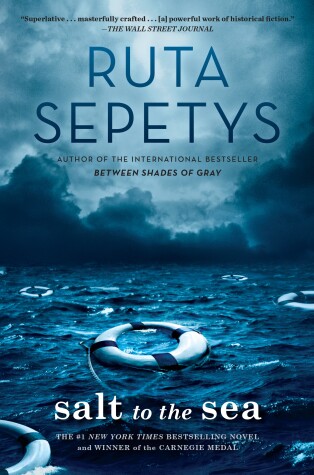Reviewed by readingwithwrin on
"Joana still had her mother. Reuniting with her mother was her motivation. She would slay dragons to get to her. Mother was anchor. Mother was comfort. Mother was home. ”
If you’ve been following me for a while then you’ll know that I have loved Sepetys other books, and she is an auto-read author for me at this point. Every one of her stories is accurate to the time period and the way she writes the characters makes you feel like your right there with them.
We follow four teenagers
Florian – A “german” who is caring a secret, a secret that could not only get him killed but those he is now traveling with as well.
Emilia – A young girl who is lost, parentless, pregnant, and terrified of most men in general now.
Joana – A nurse who is taking care of Ingrid, the shoe poet, Eva, and the wandering child (Klaus). Not only does she feel responsible for these four people, but she also wants to help as many others as possible and get back to her mother to try and right the wrong she feels she has done that caused her extended family to be sent away by Stalin’s soldiers.
Alfred – A German Sailor who lives more in his head than in real life.
Each chapter is only a few pages long, and as we get towards the end of the book it gets to just a few sentences as we switch back and forth between the characters. I got so attached to most of these characters ( I found Alfred’s part a little annoying with his mental letters he was constantly writing). By the time they got on the boat and you could tell that the end was near I didn’t want the story to end, I didn’t want the boat to leave port, and when the torpedo’s hit my heart broke for all of the people on-board.
“The Wilhelm Gustloff was pregnant with lost souls conceived of war. They would crowd into her belly and she would give birth to their freedom.”
The water was freezing, and there weren’t enough life boats (only 12) once again, and the ones that were on board weren’t filled to capacity due to panic. When the few survivors were picked up surprisingly considering they were surrounded by Russian Submarines, they were taken to safety, and towards the start of their new lives.
I also really loved the connection this book had with Between Shades of Gray with Joana being Lina’s cousin. If anyone knows of any other books about this tragedy or Lithuanian’s during the WWII please let me know.
I'll leave you with, the authors note from the acknowledgement
Every nation has hidden history, countless stories preserved only by those who experienced them. Stories of war are often read and discussed worldwide by readers whose nations stood on opposite sides during battle. History divided us, but through reading we can be united in story, study, and remembrance. Books join us together as a global reading community, but more important, a global human community striving to learn from the past.
What determines how we remember history and which elements are preserved and penetrate the collective consciousness? If historical novels stir your interest, pursue the facts, the history, memoirs, and personal testimonies available. These are the shoulders that historical fiction sits upon. When the survivors are gone we must not let the truth disappear with them.
Please, give them a voice.
This is why I love Historical Fiction and Ruta Sepetys books, she always reminds you that these books are based on real stories and that this is what some people's lives were really like during this time period.
See reviews first on my Blog
Reading updates
- Started reading
- 17 February, 2016: Finished reading
- 17 February, 2016: Reviewed
